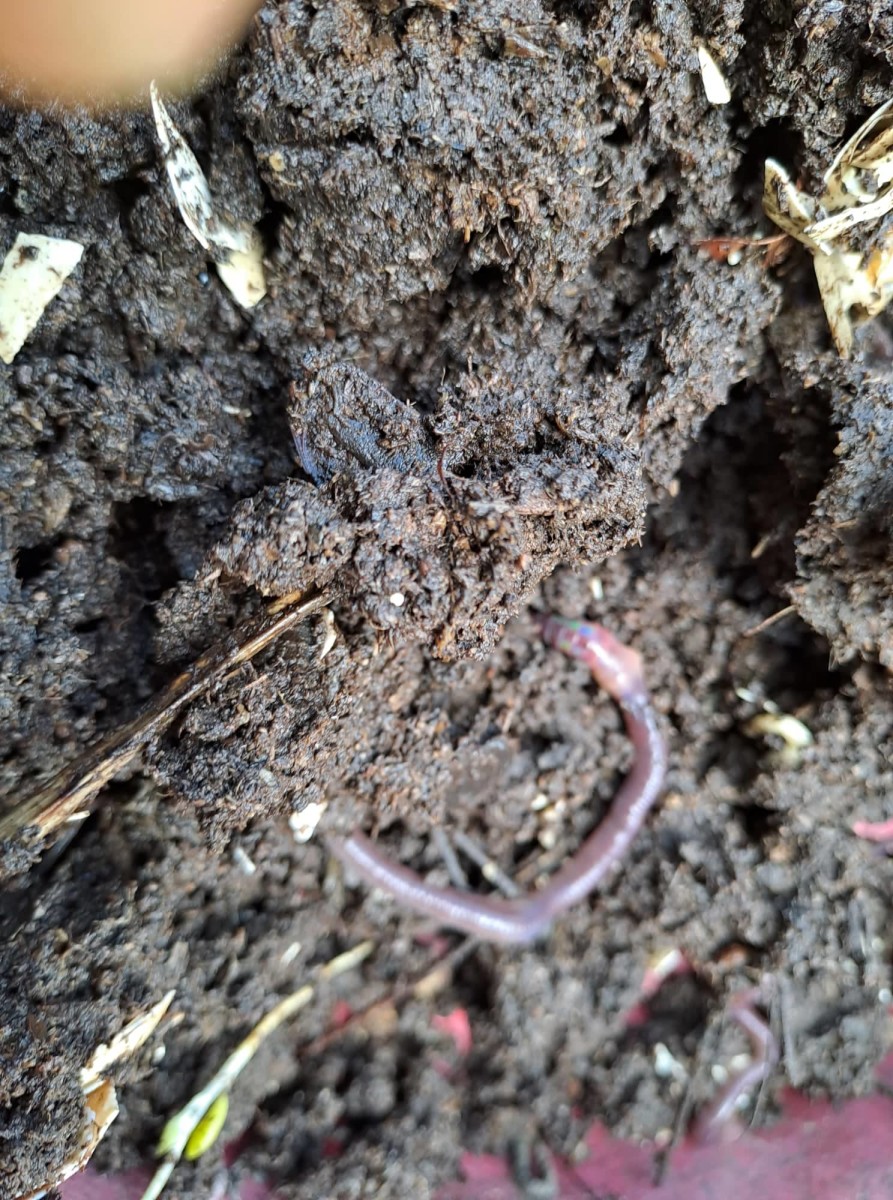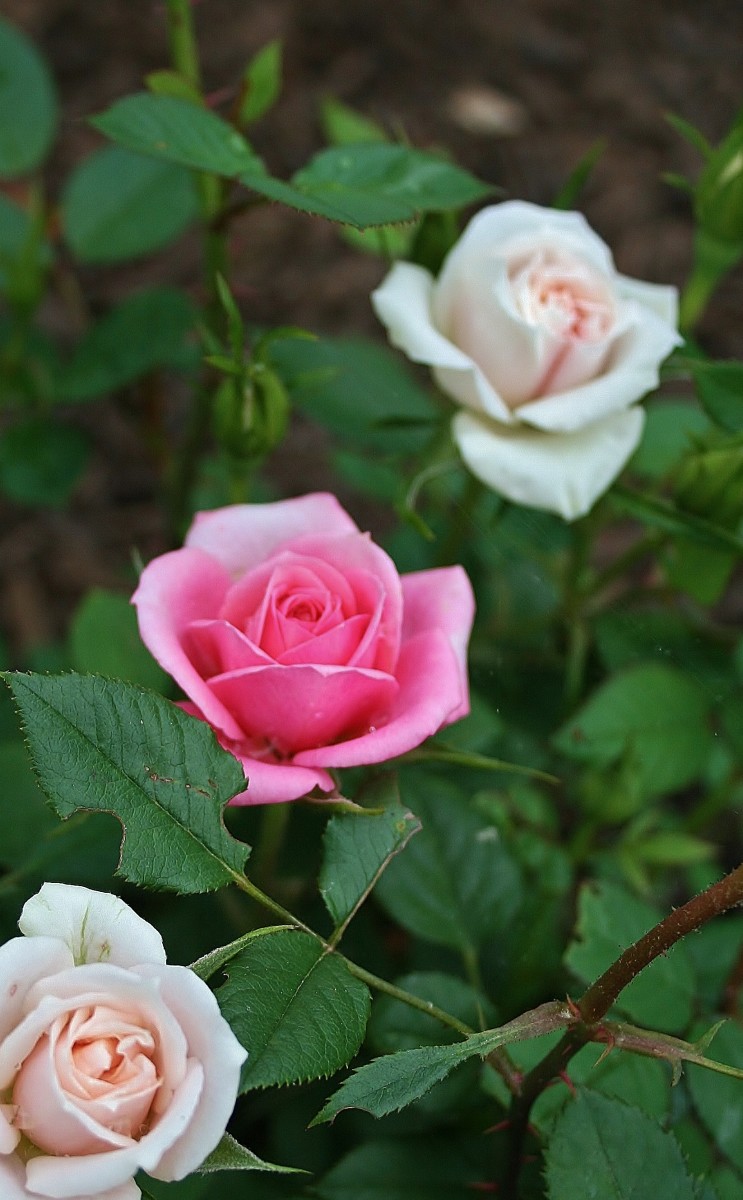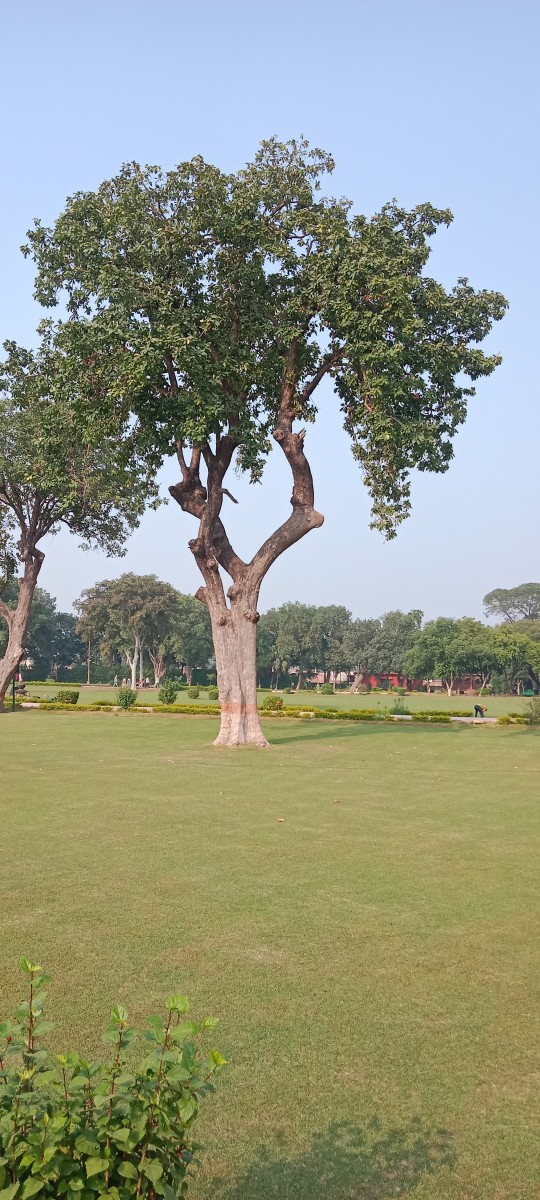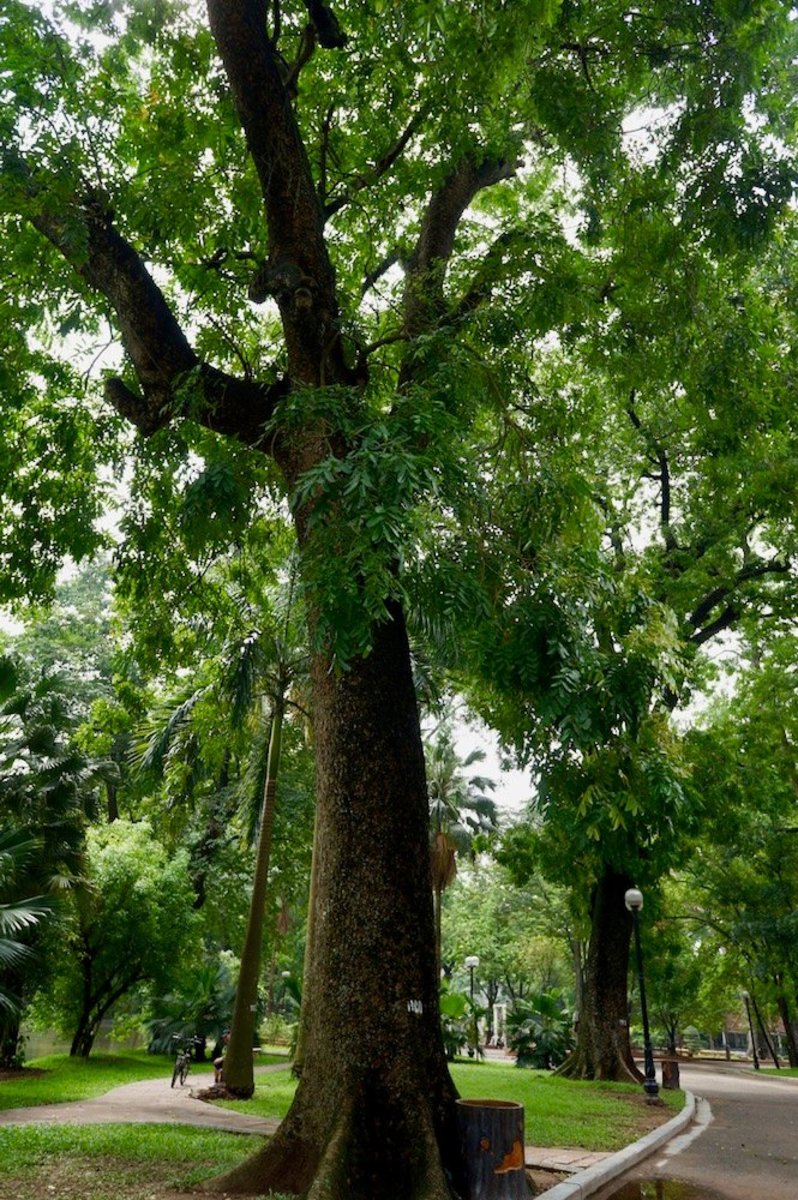Organic: Way to Health
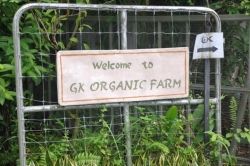
Eat Healthily, Live Healthily!
A very good morning (well it's morning here ;) to all visitors and squidoo-ers!
"Eat Healthily, Live Healthily", I am sure everyone came across the saying, right? And do not take it for granted! It is very important to have a healthy and fit lifestyle to ensure one's longevity.
In conjunction with this, I've led a team of my course mates to visit an organic farm, namely GK Organic Farm, located near Bangi, about 50KM south and one hour drive from Kuala Lumpur to understand and explore ourselves to "What is Organic?"
This lens serves as write-up of my understanding of the word "Organic" and I hope you guys enjoy the write-up-trip as I do!
Disclaimer: Information stated are accurate as of the time written. All photos and images are copyrighted by me unless stated. Thank you. Do enjoy!

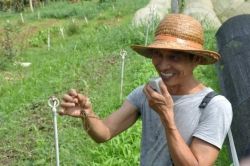
Let's get started!
Are you as excited as I do?
A bit on GK organic farm background history.
GK organic farm is founded by Mr. Gan Koon Chai (Handsome guy in the picture), a graduate of agriculture from UPM with the help of two professors and a friend. The farm is certified by Skim Organic Malaysia (SOM) in year 2008. The land originally belongs to private owners, with attempt to convert it into orchards farm, but to no avail, it was neglected. Over the years, once an oil-palm plantation farm that had been cleared and abandoned for 7 years, surrounded by secondary forest all around, gradually developed for housing. With only sickles, Mr. Gan and his mates started off with only some experimental beds. AND..... that's how they started and eventually get bigger and bigger.
Walking through small alleys and streams, crawling ups and downs, phew, it was indeed a long way deep in a jungle! Upon reaching, we're welcomed by a very friendly farm assistance by the name of SK II (Are you thinking what I am thinking, well SK II is not the beauty product you're thinking, lol). We're pleased to an open hall named "Wakaf" and served with fresh papayas and Roselle prior starting our journey.
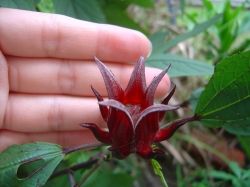
What is "Organic"?
No chemicals? Pure natural?
Organic by surface means, it is environmental bio-friendly without any chemicals being inputted.
Descriptively, the beautiful biodiversity of life should be preserved for the future, for a better health and also without violating animals‟ right. Wild animal life should not be contained and suffered from food sources. Whereas, plants should be treated as natural as possible, for example, feed them with organic fertilizers, fresh water from the jungle stream and also live harmoniously with insects as a balanced ecosystem, due to the fact that plants such as papaya and Roselle (a type of hibiscus - Refer picture) need around 10 months time to a year to grow.
Useful facts of Roselle, you might want to know!
Roselle is a vitamin C and iron rich hibiscus. It contains 40 x vitamins C compared to orange. It is good for those for suffer from flu, sore throat, amnesia and high blood pressure. In addition, it also increases one's immunity and enhances female's menstrual period. Roselle's dry leaf can be served as tea. Although Roselle' seedlings are fragile, they have strong growing power and able to withstand under hot sun, strong wind and heavy rain.
We were also briefed on How to avoid Cancer, thought of sharing with you guys!
50% of the risk of getting cancer is mainly due static electricity, also known as electrostatics that accumulated in our body and is not properly discharged.
Hence, some ways to effectively discharge electrostatics are through
- eating more vegetables, such as salads,
- exercise regularly and
- walk bare foot on carpet grasses, garden, lanyard, areas that are exposed to sunlight.
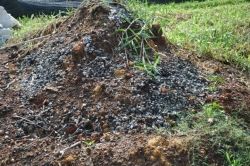
Key Ingredient in Organic Farming
Compost eh?
Soon after the briefing, we were guided on a farm tour and were introduced to compost, a key ingredient in organic farming!
Quick Facts on What-Is-Compost:
Compost is an odourless organic matter that has been decomposed and recycled as a fertilizer and soil amendment for the plants. It is prepared by heating at a temperature of 50 to 60 degree Celsius. It requires piling up every 6 weeks for the materials to break down. It is a jungle soil, which consists of many organic matters which are fermented after several months. These organic matters contain varieties of microorganisms that are useful for the soils. 90% of the compost here are from cut grass, tree trunks and dead crops.
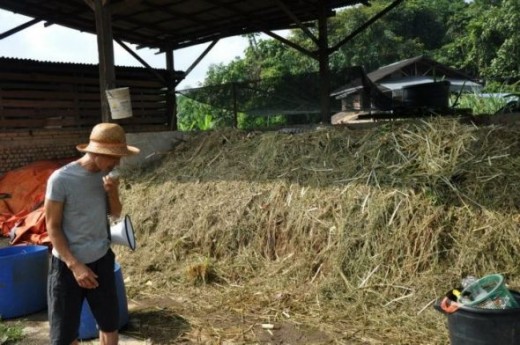
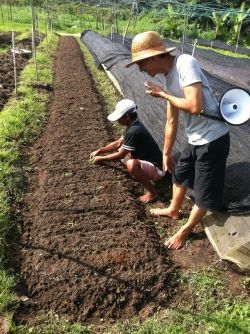
Hands On Planting
The feel of fresh soils
Following on, we were guided on hands on planting mustard greens, also known as sawi.
The seedlings are so fragile that we were advised to not hold their stem for too long during plantation as our body temperature is enough to cook them. Lines were drawn on the organic soil, and to plant the seedlings, we must first poke a hole with our index finger and then put them in slowly, one by one with a two inches gap.
Just-So-You-Know:
The seedlings are then watered by water sprinkler. By this way, we do not need to carry a water barrel around everywhere. Water is pumped from the jungle pond to a water tank, and then let it flow down by gravity. After a thorough watering, the first stage of baby seedlings are then covered with a black netting for a week to prevent the strong sunlight from penetrating as seedlings only require a minimum of 50 % of sunlight sources.
After that, we were toured on a series of grownups herbs such as sawi, kangkung and cabbages!
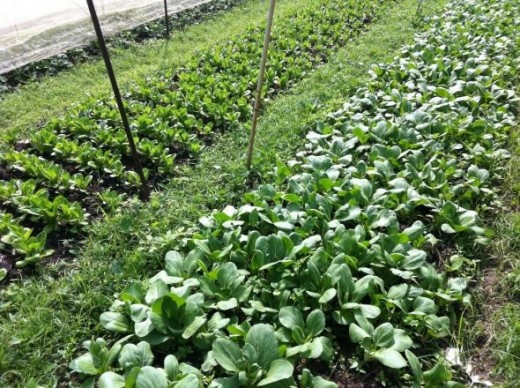
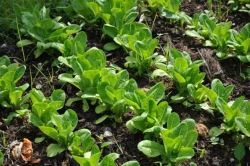
Symbiosis Growing
What is symbiosis? :O
These organic herbs are grown together with weeds and grasses as symbiosis means, meaning that they survive very well and take care of each other, or in other words, they help each other out.
For example, Grass is capable of breaking down the soils and transforming the minerals into active components and capable of acting as temporary fertilizers storage in its body. When they grow into a certain height, they are cut down and recycled back to the compost heaps. The compost heaps are then recycled back to soils again for growing of plants. The fertilizers cycle continues.
Moving on, we were then introduced to the Method of tilling soils - Traditional VS Modern Way.
Traditionally, we use a hoe, also known as cangkul to till the soil by hand. In this modern century, soils are tilled by mechanical means. We use a small tiller machine to till the soil evenly before we grow anything. However, using a tiller machine is NOT preferable because to till the land, means we are breaking every particles of the soil till it is loosen up. Plants' roots cannot penetrate nicely into the soils to have a firm grip and will eventually fall especially during heavy rains and strong winds. Unlike using the traditional hoe, most of the big particles are still remain intact, so that the roots can penetrate and hold firmly to the soils.
In conclusion, the best is still tilling soils by hands. :)
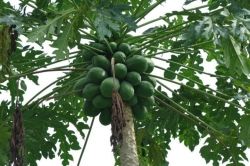
Quick Facts On Some Fruits
Papaya, Roselle, Cabbages.
For my readers benefits and pleasures, here's a quick summarize facts that I've benefit and collected on:
Papaya Fruit:
a. Used in enzyme making purposes.
b. Contains white latex known as papain, which is very good for our digestion system.
c. Very good in easing poor digestion and tiredness.
d. Papain can further be used as a tenderizer for our cooked meat.
Roselle:
a. Has a sourish taste and sweetened by the organic sugar.
b. Roselle leaf can actually be eaten raw.
c. Good for our skins.
d. Helps regulates the body hormones especially for woman having their period.
Cabbages:
a. Can wrap by itself to different shapes due to the difference in daytime and the night time temperature. (Refer pic below)
b. If the temperature gap is higher, the cabbages can wrap nicer and firmer, vice versa,
c. If the temperature is all the way hot from daytime to night time, the cabbages will not wrap.
d. Insects only feed on old cabbages leaves, the young leaves are left untouched except for grasshoppers.
Moringa:
a. Leaves of the moringa can be served as tea or in soup.
b. Very good for our kidneys especially for those with kidney failures.
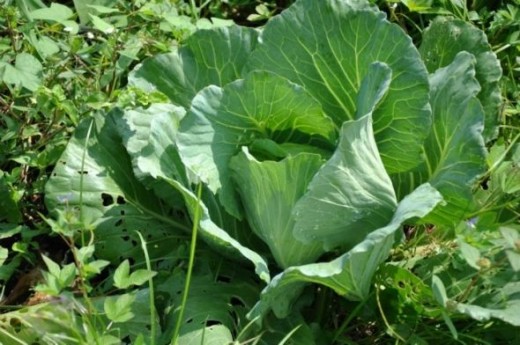
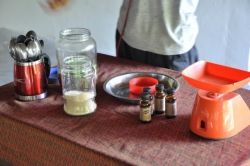
Process of Making Enzyme Syrup
Good for treating coughs!
Roughly an hour of farm tour, we headed back to the wakaf. We were served with fresh sugar cane juice directly from the organic sugar cane without any sugar or preservatives added. It was so mouth-delighting!!
Moving on, The Process of Making Enzyme Syrup:
1. No water is used in the fermentation process of the enzyme. Instead, brown sugars are mixed in.
Small Note: White sugars are not used as they are the extracts of the brown sugars that are being purified and bleached, left with only the saccharides of sweetness!! Unlike, brown sugars still preserve their organic minerals.
2. 20g of Indian mint (nice fragrance smell when rubbed on hand) are cut roughly one inch apart into the fermentation jar.
3. Roughly 20g of brown sugars are mixed together.
4. The jar is then covered up and shaken well and thoroughly and kept under shade.
5. After two days, the jar is stirred or shaken again for the second time.
6. Make sure the jar is completely sealed as small insects might able to crawl in.
7. Two days later, the jar is stirred again for the third time.
8. The jar is then left for 6 months for the natural fermentation process.
9. Roughly 3 months, the jar is inspected and observed for any bubbles forming.
Note: If there is no bubbles forming, means the enzyme syrup is ready to be served. But if there is still bubbles forming, means the enzyme syrup is still undergoing fermentation process.
The syrup tasted exactly like the normal cough syrup that we buy outside at the pharmacy store!! Sooner after some briefing presentation, we're served with local organic food, tasty, yummy! <3
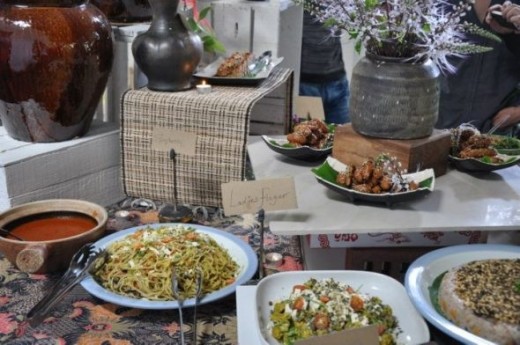
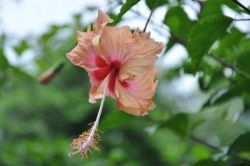
Does it matter Organic or Non-Organic?
In terms of nutritional values?
Well, it is solely up to you to decide.
According to the research on organic food that the New York Times did in 2003, their report was that "recent preliminary evidence suggests that the levels of certain nutrients, especially vitamin C, some minerals and some polyphenols -- naturally occurring antioxidants that may help bolster the immune system -- are higher in organically grown crops." Cited from The Benefits Of Organic Food For Your Health
Nowadays, many farmers are taking healthy plants growing for granted. In order for quick turnaround and have their plants to grow larger and more bountiful, tons of pesticides and toxins are added and mixed. Do you want pesticides and toxins in your body?
"Pesticides have been linked to making people ill, and can cause a person to avoid fresh vegetables that are needed for an overall healthy diet. Toxins in the body can cause problems such as headaches and tremors."
To help reduce the risk of these undesirable benefits, NATURAL and ORGANIC should be definitely taken into consideration when choosing foods because one fact is for sure, Organic foods lacks the addition of artificial preservatives, sweeteners nor hydrogenated fats. Should you too? Well I am convinced. :)
Take a look at the world population chart below:
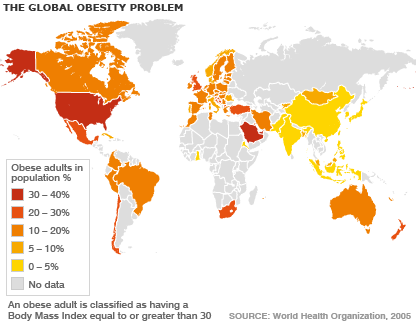
Image courtesy of Obesity: in statistics
Conclusion & Wrap Up!
Yay! Finale! Almost there!
To summarize "Organic":
1. Organic are crops grown in safe soil, have no modifications, and remain separate from conventional products.
2. Organic products do not contain GMOs (Genetically Modified Organisms).
3. Is organic food more nutritious than non-organic food? (Source and evidence are unclear, some claim that organically grown fruits and vegetables may contain slightly higher levels of vitamin C, trace minerals, and antioxidant phytonutrients than conventionally grown produce.)
4. Organic produce contains fewer or no pesticides.
5. Organic food is often fresher and tastes better.
6. Organic farming is definitely better for the environment and induces less pollution and harm to the "GREEN".
7. Organic crops are grown with natural fertilizers (manure, compost).
8. Weeds are controlled naturally (crop rotation, hand weeding, mulching, and tilling).
9. Insects are controlled and handled using natural methods (birds, good insects, traps).
Conclusion in my personal opinion, although organic products are less attractive and dull in taste, but they are natural and they contain all the goodness and essence necessary for our body, unlike commercially produce crops! Also, I do enjoyed a lot from the trip!!
For more information on GK ORGANIC FARM, do contact:
Email them at gk_organicfarm@yahoo.com
So yeah, I hope you enjoyed the write-up and benefit from it. Thank you!
Stay tune for more interesting lens write-up! Cheers!
Live Life with NO Regrets!

Take care of your body. It's the only place you have to live." - Jim Rohn
Image courtesy of Diary2Myself.

